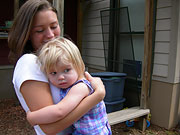
Laura Sadelson, a teacher at Mountain Area Child and Family Center in Swannanoa, with one of the toddlers she watches over. photos by Rebecca Bowe
|
Nobody ever said raising small children was easy. But if you live in Buncombe County and you need childcare, good luck — especially if you’re poor, working your way through school, have a special-needs child or have suddenly fallen on hard times.
With one of the highest costs of living in North Carolina and a job market where even highly educated people often find themselves working in dead-end service jobs just to make ends meet, Buncombe County is hardly the easiest place to find affordable, quality childcare. Yet the county ranks dead last in terms of public assistance for childcare. In Orange County, for example, a three-star-rated center providing a month of care for an infant would be paid $845 by the state. But in Buncombe, the same care would receive just $585 in state funding.
Together, these factors add up to a full-blown crisis, child advocates say. Organizational and management consultant Leslie Anderson has no small children of her own, yet she spends inordinate amounts of time badgering elected officials and bureaucrats to get them to address the problem. Trying to drive home to this reporter the predicament facing literally thousands of couples and single parents throughout the county, Anderson repeatedly pounds the table.
And because the early years are crucial to a child’s social, intellectual and physical development, haphazard, substandard care provided by friends, family or neighbors is not an acceptable option, she contends.
“It’s time to do something — right now!” Anderson proclaims, slamming the table once again. “Not tomorrow, not next week. Right NOW!”
A deadly deficit

A child left behind: The gravesite, with a temporary marker, of Devin Gibson, the 8-year-old whose death in a car while his mother worked a double weekend shift last year sparked months of community soul-searching about caring for children of the working poor.
|
Those who can’t afford to pay the going rates for childcare often face harsh choices. For many, it can mean being forced to drop out of school or the work force in order to stay home with their kids. And sometimes, such situations prove deadly.
Recently acquitted of second-degree murder and felony-child-abuse charges, Michelle Gibson said she had no one to care for her 8-year-old son, Devin, as she struggled to climb out of poverty by working as a nursing assistant. Left in his mother’s car, the youngster died of heat exhaustion while she worked a double, weekend shift at a Jackson County nursing home last year. Authorities found Devin’s lifeless body in the car at the family’s temporary home in the Woodcroft Apartments public-housing complex in north Asheville.
“She had just been to the well too many times” asking for help with childcare, says Randy Seago, Gibson’s court-appointed lawyer. “There’s a knee-jerk reaction to say: ‘Why didn’t she call me? I would have taken care of him.’ Well, yeah, in hindsight, knowing that he’s dead now, we all would have. But what if a friend of yours calls you up late Friday night and said: ‘Hey, I’m a little creeped out by my regular babysitter, and I’ve got these two back-to-back, 16-hour shifts. You think you could take care of my [attention-deficit-disorder son] all day Saturday and all day Sunday?’ You know, she can’t do that. She could, but there’s only so many times she can do that. She just felt like a burden and thought this would work.”
In such situations, there are no ideal options, notes Jacque Penick, director of the Mountain Area Child and Family Center in Swannanoa. “It’s heartbreaking to see what a lot of families have to endure,” she says. “And they’re trying. They’re trying really, really hard.”
The waiting game
Clearly, more money is needed to address the problem in Buncombe and elsewhere — as much as $33 million annually statewide, according to a report by the N.C. Division of Child Development. And though the General Assembly is expected to pump some additional millions into the system in the next fiscal year, it will probably be a Band-Aid, not a cure, child advocates predict. Still, every member of the local legislative delegation — led by Rep. Wilma Sherrill, who serves on the House’s budget-writing committee — has vowed to make Buncombe’s child-care crisis a top priority in the current short session. At press time, the General Assembly was in the process of finalizing the state’s 2006-07 budget.
North Carolina does offer some financial help for qualifying families. Those that meet need and income criteria can apply for state vouchers that cover most of the cost of childcare. Income limits are based on family size. For a family of four, the gross monthly income cannot exceed $3,531. “Need” can mean any number of things, but parents typically need childcare in order to work or attend school. At the moment, however, there are 31,184 children on the statewide waiting list for vouchers, according to Amy Pike, the social work supervisor for Buncombe County Child Care Services.
Meanwhile, state and federal assistance to Buncombe County have been cut by $171,000 (to $7.4 million) in the current fiscal year. And though census data suggests that some 8,000 children in the county might be eligible for subsidized care based on household income, fewer than 2,000 are actually receiving it. Yet the county’s waiting list for vouchers contains only 122 names, says Pike.
But that figure is artificially low, she maintains. Unlike most N.C. counties, Buncombe requires proof of employment or school enrollment or some other need for childcare as well as income verification upfront in order to even get on the list.
“We also have found that when word is out that we don’t have funding, people don’t bother to come in and put their name on the waiting list,” notes Pike. “That waiting-list number is certainly not a true indicator of the true need in our community right now.”
Her boss, Child Care Services Director Fran Thigpen, describes the dilemma this way: “Parents say, ‘How am I supposed to work at a wage that doesn’t allow me to pay for childcare, but I can’t get childcare unless I’m working? And I have to work 30 hours a week, but how can I work 30 hours a week? Who is going to watch the children?’ Even parents on the waiting list that are working, they have to have some way to pay for childcare while they wait. Or they don’t work or go to school. It’s a huge, huge issue. Some of the parents must make excruciating decisions,” she says.
But even if a parent is fortunate enough to receive a child-care voucher, the state almost always pays Buncombe County care providers less than what nonsubsidized families are charged. The state also requires subsidized parents to pay a portion of their childcare costs. That fee, paid directly to the care provider, can amount to as much as 10 percent of the family’s gross monthly income. And if that parental fee plus the voucher still fall short of the higher rate paid by nonsubsidized parents, many providers require parents to make up the difference. A state survey last year found that in Buncombe County, 46 percent of centers and 61 percent of in-home facilities required such extra payments.
Short end of the stick

Seeking solutions: Jacque Penick, director of the Mountain Area Child and Family Center, at the daycare facility.
|
Meanwhile, people who don’t use childcare may be surprised at how pricey it is. In Buncombe County these days, it costs more than a college education. A full year’s tuition at UNCA runs about $3,525. But the average cost of childcare for a Buncombe County infant is more than twice that amount — about $7,128 annually, according to the advocacy group Buncombe Cares About Child Care.
What has local child advocates riled up, however, is that despite its high cost of living and low wages, Buncombe County receives the lowest childcare subsidies among North Carolina’s 100 counties.
“Buncombe County is just getting treated in a grossly inequitable way, and that’s just not fair,” Anderson declares. “We’re being treated as second-class citizens in this state.”
Families aren’t the only ones who suffer, notes Thigpen. Care providers that have been pushed to raise their quality standards continue to be paid rates that make it hard for some centers and in-home daycare businesses to survive, leading them either to shut down or to avoid accepting subsidized children. Last year, for example, 10 child-care centers closed in the county and six new ones opened, resulting in a net loss of 103 slots for low-income children, Thigpen says. In the past five years, the number of licensed child-care programs in the county has declined by 15 percent, says Pike. This, of course, only exacerbates the problem.
Anderson, who served as an unpaid consultant to the now defunct Asheville Day Nursery, says the 60-year-old facility just couldn’t make it, even with outside help from United Way, because nearly all its children were subsidized. “It was almost a pure model of whether a center can operate on what the state pays,” she said. “They couldn’t make it; it just wasn’t enough.”
But the ultimate solution isn’t simply more money, advocates say. Instead, what’s needed is a complete overhaul of the state’s formula for determining how that money is allocated.
Skewed rates
One might expect state child-care subsidies to be tied to such common indicators as average wages, housing costs, the U.S. Consumer Price Index and other such indices, which can provide at least a reasonably accurate picture of what it actually costs to live and raise children in various Tar Heel counties.
But in fact, the reimbursement rates don’t consider any of those factors. Instead, the state uses a complicated formula based on “market rates” which, critics contend, do not conform to reality.
Even child-care officials such as Thigpen and Pike have a hard time explaining the formula, but basically it works like this: Licensed centers and in-home child-care facilities statewide are surveyed biennially to determine what they charge their nonsubsidized clients. The survey is broken down into four age groups as well as by licensing status and type of facility (i.e. child-care center or home daycare).
In North Carolina, both types of facilities are assigned one to five stars: Newer or lower-quality centers typically have from one to three stars, while more established or higher-quality operations have three to five stars. All told, that adds up to 20 different criteria for both freestanding and home-based operations (four age groups multiplied by five rating levels), figured separately for each county.
Using this data, the state sets market rates at the 75th percentile in each of the 20 categories in each county. For example, if the surveys showed there were 100 children whose parents paid for childcare in a certain county, the market rate would be the 75th rate (counting from the bottom) paid for an individual child there. After that, a similar formula is used to come up with a state market rate, which is almost always higher (and sometimes much higher) than the individual county market rates.
And therein lies a key to Buncombe’s troubles. Because unless there are at least 50 private-pay children in a given category, the higher state market rate is automatically used. As a result, largely rural Madison County receives higher subsidy payments than neighboring Buncombe. In Madison, all 20 categories use the higher state market rate. In Buncombe, 16 of the 20 categories are below the state market rate.
Expired
If all that weren’t enough, Buncombe County faces yet another hurdle: The data used to set the rates being paid to local child-care providers is based on 1997 surveys. Although the law requires new rate surveys every two years, lawmakers are under no obligation to adopt them. In recent years, a persistent state budget crunch has deterred the General Assembly from taking such action, Pike explains. Simply adopting current rates would go a long way toward correcting the problem, proponents say.
But beyond the sea of numbers lie the very real predicaments faced by all too many local families. In a short DVD produced by Buncombe County child-care advocates, Danielle, a mother of three whose children attend the Asheville City Schools Preschool on vouchers, sums up the dilemma this way: “All I know is, if I’m not able to work and my child loses their spot — especially the child with autism, that’s my biggest concern right now,” she says, close to tears. “In May my son’s voucher will expire, and I will have to face what will happen. And I don’t know what that situation is going to be.” If the voucher is not renewed, she notes, “I will have to totally rearrange my life. It could … mean moving in order to get a cheaper house, in order to afford to keep them in a program — and that’s pretty scary for me.”


Before you comment
The comments section is here to provide a platform for civil dialogue on the issues we face together as a local community. Xpress is committed to offering this platform for all voices, but when the tone of the discussion gets nasty or strays off topic, we believe many people choose not to participate. Xpress editors are determined to moderate comments to ensure a constructive interchange is maintained. All comments judged not to be in keeping with the spirit of civil discourse will be removed and repeat violators will be banned. See here for our terms of service. Thank you for being part of this effort to promote respectful discussion.